Mega alliance in the making
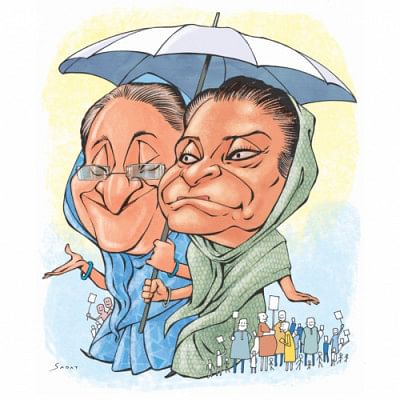
The Awami League looks all set to lead the largest electoral alliance ever to take on its archrival BNP and other opposition parties and combines in the high-stake December election.
Bizarrely, the Jatiya Party, the main opposition in the current parliament, is also in the ruling alliance, which is unprecedented in modern parliamentary democracy around the world.
Until recently, the AL led a 14-party combine. The number of components rose dramatically to 103 after the JP-led United National Alliance (UNA) and Bangladesh National Alliance (BNA) of Nazmul Huda, a former BNP minister, joined the ruling camp.
The UNA, an alliance of 58 parties, was formed in May 2017. The BNA is a combine of 31 parties.
The number of parties in the ruling alliance may rise further as Juktofront and Islamic Democratic Alliance (IDA) have expressed their interest to join forces.
Led by former president Prof Badruddoza Chowdhury, Juktafront was also formed last year with four parties. It is now an alliance of eight parties.
Formed in September this year, the IDA is a combine of 18 Islamic parties. Misbaur Rahman Chowdhury, chairman of a faction of Islami Oikya Jote, leads this alliance.
With them, the ruling alliance will be a combine of 129 parties, beating a three-decade old record.
However, most of the parties in the ruling alliance are not registered with the Election Commission, meaning they cannot contest the polls. Their leaders can run independently or with tickets from alliance partners who are registered.
Ahead of the fourth parliamentary election in 1988, the Combined Opposition Party was formed comprising around six dozen parties under the leadership of ASM Abdur Rab. Amid boycotts by the AL, the BNP and several other opposition parties, the opposition combine contested the polls against the then ruling Jatiya Party and emerged as the main opposition in parliament. It secured 19 seats.
This time, the mega ruling alliance is set to take on the BNP-led 20-party alliance and the Jatiya Oikyafront, the newly formed alliance of BNP and several other parties -- Dr Kamal Hossain's Gonoforum, Mahmudur Rahman Manna-led Nagorik Oikya and ASM Abdur Rab-led JSD.
Apart from these, there is an alliance of eight left parties called Left Democratic Alliance.
'NO SUCH INSTANCE'
Forming electoral alliances is common around the world. But the main opposition party joining the ruling alliance is unheard of, experts said.
"As far as I know, there is no such instance in the contemporary history of parliamentary democracy across the globe," parliamentary affairs expert Prof Nizam Ahmed told The Daily Star on Monday.
"It seems the impossible has been made possible," said Prof Nizam, who teaches public administration at Chittagong University.
For the last five years, former military ruler HM Ershad's Jatiya Party has been playing the role of a "friendly" opposition in parliament.
Party Co-chair Raushan Ershad is still the leader of opposition in the current parliament and enjoys a minister's status. Her husband Ershad remains the special envoy to Prime Minister Sheikh Hasina, also with the status of a minister. Moreover, the JP has three ministers in the current cabinet.
The JP took part in the 2008 election as a component in the AL-led grand alliance. The party quit the alliance before the 2014 election and emerged as the main opposition in parliament. The BNP and many other parties boycotted that election as it was not held under a nonpartisan administration.
Things are different this time. After talks with the AL at the Gono Bhaban on November 5, the JP announced that it would contest the election with the AL-led alliance.
According to political analysts, the party made the announcement sensing that the BNP-led 20-party alliance and the newly floated Oikyafront may join the race.
Dr Iftekharuzzaman, executive director of Transparency International Bangladesh, said that JP's joining the ruling alliance is both unprecedented and embarrassing.
"Unprecedented because while it is a standard electoral practice for any two or more parties to forge an electoral coalition, it is rather extraordinary that they are doing so when one is an incumbent ruling party and the other an incumbent opposition in the government of the day," he told The Daily Star on Monday.
And it is embarrassing because it only reconfirms and reminds the people of the fact that those who were placed in the role of opposition was never sure of its role. It had one foot in the government and the other in the opposition, he noted.
"It will be ominous for the future of an accountable democracy in Bangladesh if the underlying idea is to institutionalise this concept of a ruling-cum-opposition party in parliament," he said.
SEAT SHARING: AN UPHILL TASK
The size of the ruling alliance, however, is also a cause for headache for the AL, which faces an uphill task of sharing seats among its partners.
More than 4,000 aspirants bought AL nomination forms -- an average of 13 leaders looking to contest from each of the 300 seats.
Among its partners, the JP has sought 100 seats, and Ershad expects that they would get at least 70, sources said.
However, a senior JP leader with close contact with the AL said the ruling party hinted it could offer up to 40 seats.
Workers Party of Bangladesh, Jatiya Samajtantrik Dal, Jatiya Party (Manju), Samayabadi Dal and Tarikat Federation, who are old partners in the alliance, will also get some seats.
In all, the AL would not offer more than 70 seats to its partners, party sources said.
BNA chief Nazmul Huda gave a list of 25 of its aspirants to the AL.
"We will negotiate with the Awami League to get as many seats as we can,” he told The Daily Star on Monday.
The Islamic Democratic Alliance has sought 10 seats, said its Co-chairman MA Awal.
The AL has yet to start discussion on sharing seats among its allies.
Meanwhile, Juktofront leaders yesterday held a meeting with the AL General Secretary Obaidul Quader and expressed their interest to join the grand alliance.
"We will sit again soon with the Awami League to finalise our joining and seat sharing," Juktafront leader Mahi B Chowdhury told reporters after the meeting at the AL president's Dhanmondi office.
Mahbubul Alam Hanif, joint general secretary of the AL, acknowledged that the issue of seat sharing might get a “bit complex” as a result of so many parties joining the grand alliance.
"But it is a positive thing that more and more political alliances are showing interest to take part in the polls under the banner of the grand alliance. It proves that everyone has support for the Awami League."


 For all latest news, follow The Daily Star's Google News channel.
For all latest news, follow The Daily Star's Google News channel. 

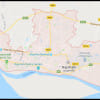
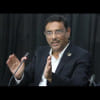
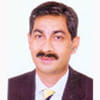
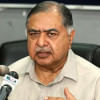
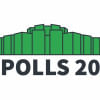


Comments